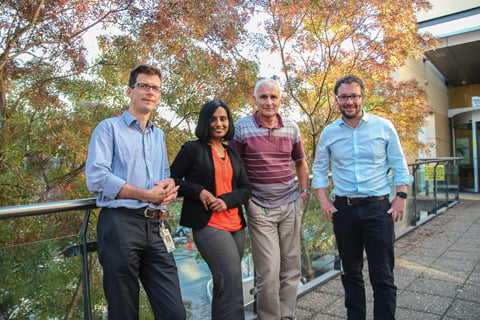Search
Research
Limited impact of neonatal or early infant schedules of 7-valent pneumococcal conjugate vaccinationEarly 7vPCV schedules have limited impact on pneumococcal vaccine type carriage in PNG
Research
Strongyloides seroprevalence before and after an ivermectin mass drug administration in a remote Australian Aboriginal communityWe report the impact on Strongyloides seroprevalence after two oral ivermectin mass drug administrations (MDAs) delivered 12 months apart in a remote Australian Aboriginal community.

News & Events
Pioneering technique opens new window on first week of lifeAn international team of researchers has pioneered a technique which gives unprecedented insight into the dramatic changes occurring in a baby’s body in the first week of life.

News & Events
Institute celebrates eradication of rubella in AustraliaThe eradication of rubella in Australia is evidence of the vital role vaccinations play in protecting our health, researchers at The Kids Research Institute Australia say.

News & Events
Australian parents oblivious to true danger of the fluNew research investigating the devastating impact of the 2017 flu season by PAEDS-FluCAN, a national collaboration observing influenza in children, confirmed it was time to take action after thousands of children were hospitalised with the virus last year.

News & Events
Vaccine surveillance brings safety reassuranceIn 2010, a large number of children experienced febrile convulsions after receiving the FluVax vaccination and many parents began to question its safety.

News & Events
The Kids Research Institute Australia researcher awarded support fundingA Kids Research Institute Australia researcher has been awarded $10,000 from the New Independent Researcher Infrastructure Support (NIRIS) award.
News & Events
Time running out to prepare for flu seasonPeople are being urged to ensure they've had their vaccination with the 'flu season expected to hit in Western Australia within weeks.
Research
Human infant memory B cell and CD4+ T cell responses to HibMenCY-TT glyco- conjugate vaccineCarrier-specific T cell and polysaccharide-specific B cell memory responses are not well characterised in infants following glyco-conjugate vaccination.
Research
A prospective cohort study comparing the reactogenicity of trivalent influenza vaccine in pregnant and non-pregnant women.Influenza vaccination during pregnancy can prevent serious illness in expectant mothers and provide protection to newborns...
